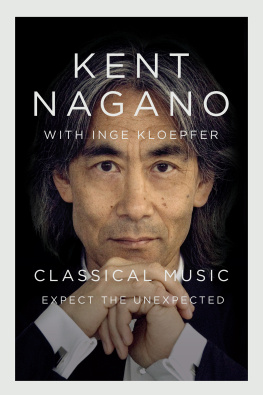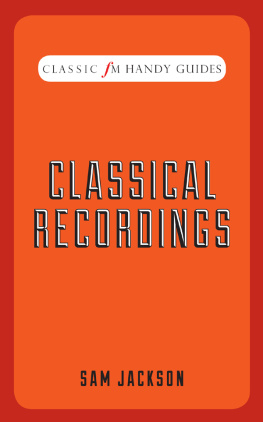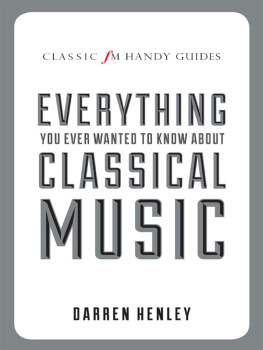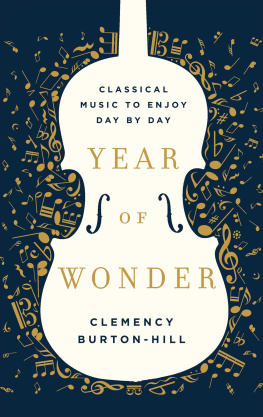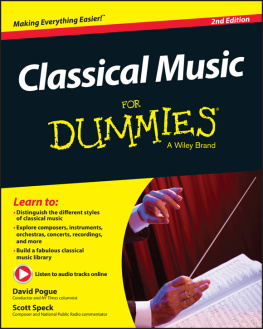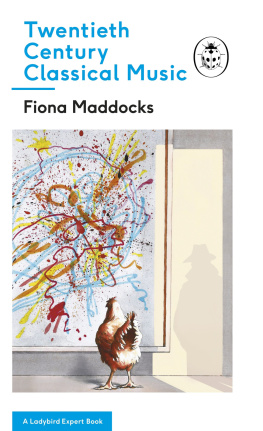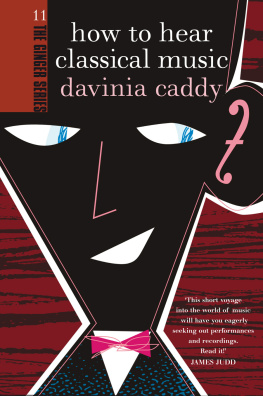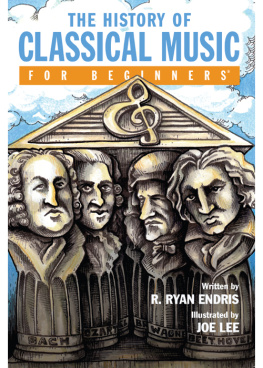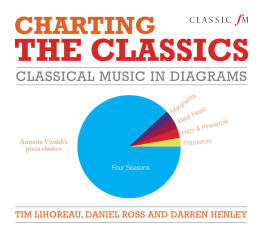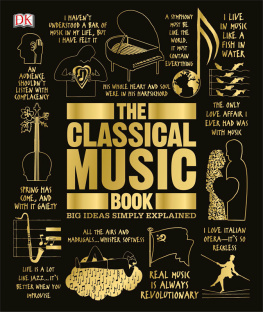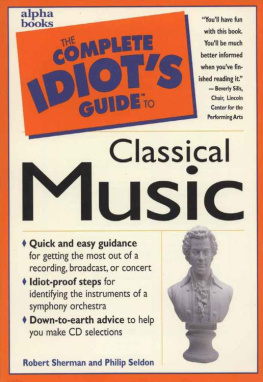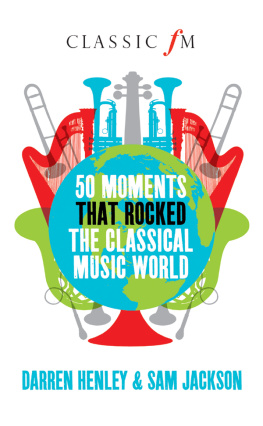
CLASSICAL MUSIC:
EXPECT THE UNEXPECTED
CLASSICAL MUSIC
EXPECT THE UNEXPECTED
KENT NAGANO
WITH INGE KLOEPFER
TRANSLATED FROM GERMAN BY
HANS-CHRISTIAN OESER
McGill-Queens University Press
Montreal & Kingston London Chicago
McGill-Queens University Press 2019
ISBN 978-0-7735-5634-8 (cloth)
ISBN 978-0-7735-5753-6 (ePDF)
ISBN 978-0-7735-5754-3 (ePUB)
Legal deposit first quarter 2019
Bibliothque nationale du Qubec
Printed in Canada on acid-free paper that is 100% ancient forest free (100% post-consumer recycled), processed chlorine free
We acknowledge the support of the Canada Council for the Arts, which last year invested $153 million to bring the arts to Canadians throughout the country.
Nous remercions le Conseil des arts du Canada de son soutien. Lan dernier, le Conseil a investi 153 millions de dollars pour mettre de lart dans la vie des Canadiennes et des Canadiens de tout le pays.
Library and Archives Canada Cataloguing in Publication
Nagano, Kent, 1951
[Erwarten Sie Wunder! English]
Classical music : expect the unexpected / Kent Nagano with Inge Kloepfer ;
translated from German by Hans-Christian Oeser.
Includes bibliographical references.
Issued in print and electronic formats.
ISBN 978-0-7735-5634-8 (hardcover). ISBN 978-0-7735-5753-6 (ePDF). ISBN 978-0-7735-5754-3 (ePUB)
1. Nagano, Kent, 1951. 2. Conductors (Music)Biography. 3. MusicHistory and criticism. I. Kloepfer, Inge, 1964, author II. Title: Erwarten Sie Wunder! English.
ML422.N33A3 2019 | 784.2092 | C2018-906119-7 C2018-906120-0 |
This book was typeset in Sabon.
Thats the pentecostal alphabet the letters of fire that God gave us: His greatest gift, the ability to talk and to communicate. And a big part of communication is music.
Leonard Bernstein (191890)
CONTENTS












PROLOGUE
What is classical music? It is an adventure we embark upon once we are willing to engage with it. Classical music transports us to another world. There it unfolds its tremendous power. And because of this power it can enrich us immensely, especially today in these troubled, accelerating times. Thats what this book is about.
There is another way to answer the question. Classical music is a universe that expands as soon as you enter it. There you will come across everything that this art form has produced in the course of almost a thousand years: medieval music, renaissance and baroque music, music of the classical and romantic periods, finally new music; opera, symphonic works, church and chamber music. When I speak of classical music in this book over and over again, the universe to which I refer encompasses all aesthetic forms of expression that have been, and are being, created through the arrangement of tones. In classical music lies our entire Western tradition, the great concept of development up to the modern era, and the canon with its treasure trove of works from different periods. In it lies our never-ending human creativity, which constantly brings forth works in this art form. But it is also where community experience lies, as well as social encounters in opera houses and concert halls. And last but not least, a consensus on the significance and value of this art form. Thats what I mean by classical music.
This book is not merely about music as such, but also about ourselves and why we should not allow classical music to lose its social relevance in our fast-moving, high-tech world that is mainly shaped by the visual. What else would remind us of our traditions traditions that we so desperately need in our postmodern state of disorientation? What else could inspire us more comprehensively, enhance our ideas more forcefully or drive us on far into the future without letting us forget who we are?
Kent Nagano, September 2018
CLASSICAL MUSIC:
EXPECT THE UNEXPECTED
CHAPTER ONE
ON CATTLE BREEDERS AND TRUMPETS
The spoken language is always connected to statements, arguments, politics or asking questions expecting answers and responses. The musical language does not have arguments; it is free and always ready to be shared, always ready to become a part of everyone.
Wachtang Botso Korisheli,
Memories of a Teaching Life in Music (2010)
A FISHING VILLAGE FILLED WITH SOUND
I have a dream. Perhaps it is misleading to start a book with a sentence that will inevitably bring me in close proximity to the dreamer. However, I am not just a dreamer; I am a realist. And that is precisely why I am writing this book. For my dream. This dream takes me far back to my childhood, to the fifties and sixties. It takes me to the West Coast of the United States, somewhere in the no-mans-land between Los Angeles and San Francisco, a four-hundred-mile stretch that even today would take seven hours to cover and only if you chose the highway.
Flush against the wild shoreline, about halfway between the two metropolises, lies the unremarkable village of Morro Bay, at the time just a small fishing village with around two thousand inhabitants from all over the world. When I think back to my childhood in that village, my memories are invariably filled with music Bachs preludes and fugues, Beethovens and Mozarts symphonies, chorales for big choirs, cantatas. It may not be unusual for a conductor to associate memories with music, given that sound determines his or her everyday life. Who does not know the suggestive power of melodies capable of conjuring up landscapes, edifices, situations, individuals and entire phases of the past in ones imagination?
But I dont mean that. I can hear music that was actually played by our orchestras and sung by our choirs at the time, because the constant presence of classical music defined daily life in our village as a matter of course. Music was part and parcel of our existence, simply always available to practice, to pass the time, to gain social recognition, to enjoy community experiences. Without music, the lives of my siblings, friends and classmates, and my own life, were inconceivable. We made music for the sake of music. At the time, none of us ordinary children envisioned a career as a musician. In my childhood and youth, there was nothing to suggest that one day I would earn my living as a conductor.
Choir and orchestra rehearsals, piano lessons and, along with them, music theory all of that determined the seven days of the week, even though my siblings and I were anything but special. Almost everyone in our rural community was involved in musical life one way or another: the children of the cattle breeders as well as those of the farmers and fishermen, the craftsmen and grocers, the teachers and the school principal. Morro Bay was a village filled with sound, something strange and unique between rocks, fields and the Pacific Ocean. As for the intensity with which the children devoted themselves to classical music and drew their parents into that world, our village was unusual, perhaps even a little weird. Music united us all, that society of immigrants from completely different ethnic and cultural backgrounds. Looking back it seems almost like a dream.
Next page
